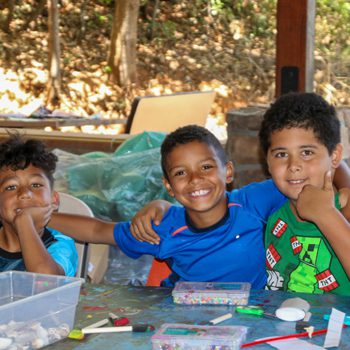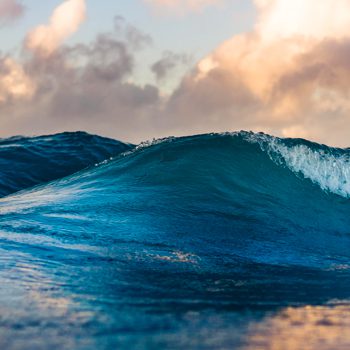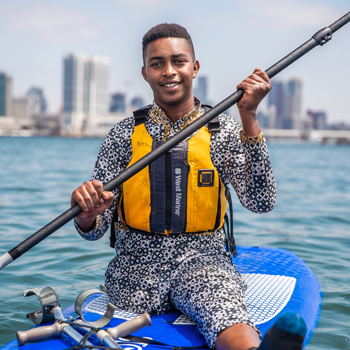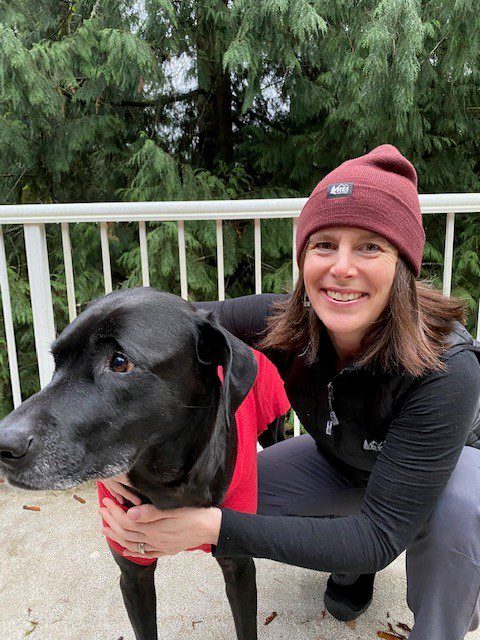Q&A: Courtney Baltiyskyy, Policy Analyst for the YMCA of San Diego County

Courtney Baltiyskyy, a policy analyst for the YMCA of San Diego County, knows first-hand how the outdoors can immediately change a child’s mood and provide a way forward. Thanks to the Thrive Outside initiative, the YMCA and quite a few other local organizations are working together to make outdoor experiences not a “nice to have” thing in San Diego, but an essential part of every family’s experience. We asked her how the programming is going and what she hopes it achieves.
Tell us a bit about the Thrive Outside initiative in San Diego.
When the Outdoor Foundation put out the RFP for Thrive Outside grants, that brought all of us to the table to figure out how we can speak the same language and work in the same direction to leverage our collective impact. Along with The San Diego Foundation, which is the backbone organization for our Thrive Outside initiative, we’re also working with U.S Fish & Wildlife Service, the County of San Diego Parks & Recreation Department, the Nonprofit Institute at USD, Parks California, and Outdoor Outreach. We want to increase volunteers, advocacy, the number of individuals who have repeat, meaningful experiences in the outdoors, and programming around trauma response and solutions to adverse childhood experiences.
What does your community need most?
There’s a lot of fear and uncertainty here around water. We see a lot of parents who don’t know how to swim, so they’re afraid for their children to be near the water. But with increased resources and system changes, we can help mitigate that fear, provide access to swim lessons through scholarships at the YMCA so that teachers and parents are more comfortable taking their kids to the beach, and just generally offer water safety awareness so that families know when it’s safe to go to the ocean.
We’ve also been able to address justice, equity, diversity and inclusion in access to the outdoors. Outdoor Outreach, for example, one of the organizations that has benefited from Thrive Outside funding has been working with youth ages 15 to 24 who are leading these conversations. They’re discussing their experiences and helping in the decision-making process as we explore new programming and outdoor outreach, and they’re compensated for their time or given access to scholarships. One of the things they’re asking for is more resources around mental and emotional health. They’ve seen their friends and peers take their lives far too often and far more frequently than we’ve ever seen. They’re also asking to help make systematic change to keep our environment as pristine as when their grandparents saw it years ago.
How have you seen outdoor experiences influence kids you work with?
I’ve seen such a transformation in kids. I’ve worked with kids who had ADHD and were on the autism spectrum, and getting into the outdoors, even if it was just on their school campus, opened them up to such a different sensory experience and really set them up for success. My drive for the Thrive Outside initiative and the partnerships we have is really to make sure that all youth have an opportunity to do that. In the current landscape, there are just too many who disproportionately don’t have the opportunity to experience the outdoors. I spent a few years in the Peace Corps, teaching in Ukraine, and I would also use the outdoors there as a tool to take a break from the classroom during the warmer months. Ukrainian school days are extremely long and rigorous—7 or 8 hours of instruction, plus tutoring—and taking a break outdoors was a great way to unlock learning.
How have the outdoors influenced you personally?
I spent a lot of time in the outdoors through Girl Scouts more than any other agency. My mom was our leader, and I had the same group of friends in Girl Scouts from Daisies all the way until we were seniors in high school. We went on regular camping trips or ski and snowboard trips, and even as adults, with our own families, we’re all still very close. I went to Girl Scout resident camp in the summers and that helped me get out of my comfort zone and try new things. It has inspired me to make sure that my own kids have those experiences and have really mindful moments in the outdoors, as well as to think about how we can be stewards of the environment in a really intentional way.
What’s your vision for the ultimate outdoor access for kids growing up today?
When we consider the broad spectrum of where youth and families are already engaging, I would hope that the outdoors is a component of each of those touch points. So if a family is going through counseling services, the outdoors is a touch point. If you’re going to school, the outdoors is a regular touch point. When people are going to community-based organizations for out-of-school programming, the outdoors should be a huge touch point. I would want to see outdoor experiences intentionally being a part of each experience that a youth or a family has, so that it’s seamlessly integrated into their identity development.




 Leaders from all sectors of the outdoor community, including Secretary-Designate of Interior Deb Haaland, discussed how public policy can increase outdoor participation in diverse communities and how increasing participation, in turn, supports outdoor policy and benefits such as youth development, environmental stewardship, overall health and wellness and more. Key topic areas that surfaced:
Leaders from all sectors of the outdoor community, including Secretary-Designate of Interior Deb Haaland, discussed how public policy can increase outdoor participation in diverse communities and how increasing participation, in turn, supports outdoor policy and benefits such as youth development, environmental stewardship, overall health and wellness and more. Key topic areas that surfaced: Outdoor recreation advocates, sportsmen and sportswomen, tribal leaders and equity experts convened to explore how we can work together to support public and private land conservation traditions in the U.S., address climate change, honor the sovereignty of tribal nations and ensure equitable access for current and future generations. Takeaways included:
Outdoor recreation advocates, sportsmen and sportswomen, tribal leaders and equity experts convened to explore how we can work together to support public and private land conservation traditions in the U.S., address climate change, honor the sovereignty of tribal nations and ensure equitable access for current and future generations. Takeaways included: Representatives of the outdoor industry and Congress came together to highlight the exciting opportunities we have to advance priorities for the outdoor recreation economy under a new Congress and administration. From combating climate change to promoting diversity and equity in the outdoors to preserving our public lands and waters and supporting a stable and predictable federal trade policy, the outdoor industry is in a unique position to work with friends and allies in support of our policy agenda. Highlights included:
Representatives of the outdoor industry and Congress came together to highlight the exciting opportunities we have to advance priorities for the outdoor recreation economy under a new Congress and administration. From combating climate change to promoting diversity and equity in the outdoors to preserving our public lands and waters and supporting a stable and predictable federal trade policy, the outdoor industry is in a unique position to work with friends and allies in support of our policy agenda. Highlights included: Outdoor brands, advocates, athletes and marketing leaders joined together to discuss the work they are doing to rethink their marketing strategies, build authentic relationships and incorporate strong representation in their advertising. This candid and transparent conversation dug into the pivotal moments from each participant’s journey and the lessons learned and best practices they’ve developed along the way. Key insights included:
Outdoor brands, advocates, athletes and marketing leaders joined together to discuss the work they are doing to rethink their marketing strategies, build authentic relationships and incorporate strong representation in their advertising. This candid and transparent conversation dug into the pivotal moments from each participant’s journey and the lessons learned and best practices they’ve developed along the way. Key insights included:
 REI Co-op has donated $1 million to the Thrive Outside initiative in hopes of helping kids in urban centers around the U.S. have repeating outdoor experiences in slices of nature close to home. As manager of REI Co-op’s philanthropy and community partnerships programs, Kristen Ragain works to support programming that ensures that every person can benefit from time outdoors. We asked her why it’s so important to support this, and how she thinks the average American’s outdoor experience could change once life begins to return to normal.
REI Co-op has donated $1 million to the Thrive Outside initiative in hopes of helping kids in urban centers around the U.S. have repeating outdoor experiences in slices of nature close to home. As manager of REI Co-op’s philanthropy and community partnerships programs, Kristen Ragain works to support programming that ensures that every person can benefit from time outdoors. We asked her why it’s so important to support this, and how she thinks the average American’s outdoor experience could change once life begins to return to normal.

